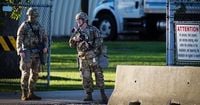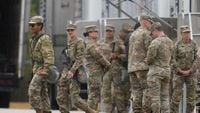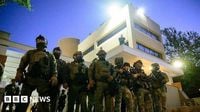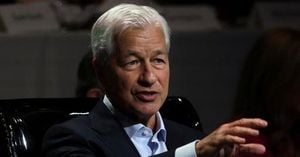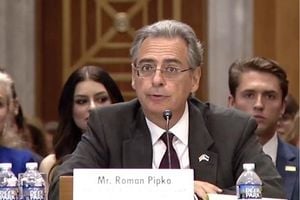In a move that has sparked fierce debate and legal wrangling across the United States, President Donald Trump’s deployment of National Guard troops to Democratic-led cities without the consent of local officials has landed in the courts and on the streets, with Pennsylvania now joining a multi-state lawsuit to challenge what critics call a dangerous overreach of federal power.
Governor Josh Shapiro of Pennsylvania announced late Wednesday that his state would join a coalition of 24 attorneys general and governors in supporting Oregon’s legal challenge to Trump’s use of the National Guard in Portland. Shapiro minced no words in his assessment, writing on social media, “Deploying the National Guard to patrol American cities over the wishes of their governors is incredibly dangerous and an unprecedented infringement on states’ rights.” According to Pennsylvania Capital-Star, Shapiro added, “Pennsylvania just took legal action to support our fellow states and put an end to the dangerous overreach of power we are seeing with Donald Trump’s Guard deployments.”
The controversy centers on Trump’s decision over the summer to send National Guard troops and U.S. Marines to Los Angeles in response to immigration protests—a move a federal judge in California ruled in September violated federal law prohibiting military involvement in domestic law enforcement. Since then, Trump has expanded deployments to Chicago, Memphis, Tennessee, and Portland, Oregon, citing the need to combat crime and protect federal officers during immigration raids and protests.
But not everyone sees these deployments as necessary or legal. In Oregon and Illinois, Democratic officials have filed lawsuits, arguing that the president’s actions violate constitutional principles and federal statutes. As reported by BBC News, court hearings began on October 9, 2025, in both Portland and Chicago to address these legal challenges. In Portland, a federal judge had already temporarily blocked Trump’s order to deploy 200 Oregon National Guard members in September, later extending the order to prevent out-of-state National Guard troops from being sent in as well. A three-judge panel of the Ninth Circuit Court of Appeals heard arguments about whether to lift the lower court’s order, with national attention focused on the outcome.
Oregon Governor Tina Kotek, a Democrat, was adamant in her opposition, stating, “There is no insurrection in Portland, no threat to national security.” Her words echoed the amicus brief filed by Shapiro and the coalition, which declared, “President Trump’s deployment of Oregon’s National Guard, and attempted deployment of out-of-state Guard forces in Oregon, without the consent of Oregon’s Governor and in violation of the statute on which the President relies, is unlawful, unconstitutional, and undemocratic.” The brief continued, “It is inconsistent with one of our Nation’s founding principles that freedom depends on the subordination of the military to civilian authority.”
In Chicago, the legal fight has been just as heated. U.S. District Court Judge April Perry presided over arguments regarding the federal government’s attempt to send National Guard troops to the city. The city has become a flashpoint for federal immigration raids, with reports of Black Hawk helicopters swooping in and chemical irritants used on protesters. In one incident, a woman was shot by a federal agent during a protest. Hundreds of Texas National Guard troops have since arrived in Chicago, escalating tensions and fueling criticism from local leaders.
Chicago Mayor Brandon Johnson was blunt in his condemnation, telling BBC News, “Handpicking National Guard people from another state, the state of Texas, and then sending them to the state of Illinois—this is illegal, unconstitutional, and dangerous.” Illinois officials argue that the Trump administration’s deployments are not only illegal, but an attempt to manufacture a crisis by stirring civil unrest.
The White House, for its part, has vigorously defended the president’s authority. Press Secretary Karoline Leavitt stated, “We’re very confident in the president’s legal authority to do this.” White House spokeswoman Abigail Jackson added, “The Trump administration is committed to restoring law and order in American cities that are plagued by violence due to Democrat mismanagement. And President Trump will not stand by while violent rioters attack federal law enforcement officers.”
This legal and political battle is playing out against a backdrop of real anxiety in the affected communities. In Philadelphia, District Attorney Larry Krasner held town halls in September advising citizens on how to respond if the National Guard was deployed to the city, while sharply criticizing the president’s approach. According to the Pennsylvania Capital-Star, Krasner’s events reflected widespread concern among residents about the prospect of military patrols in their neighborhoods.
On the ground, the presence of the National Guard has been met with vocal opposition. As reported by MSNBC, a Chicago demonstrator summed up the local sentiment: “Military occupation doesn’t make our cities safer.” The demonstrator’s words reflect a broader skepticism among many residents and officials who see the deployments as heavy-handed and counterproductive, especially amid ongoing protests and civil unrest.
Governor Shapiro, meanwhile, has pointed to his administration’s efforts to address crime through local means. He cited the funding of 1,500 additional police officers since he took office, attributing a decrease in gun deaths in Pennsylvania to these efforts. “If Donald Trump is actually serious about crime, he should support states and local governments who know their communities best,” Shapiro wrote, underscoring the argument that local solutions are preferable to federal intervention.
The debate has also highlighted a stark divide among state leaders. While Democratic governors in Oregon and Illinois have fought Trump’s deployments in court, Tennessee’s Republican governor has welcomed the National Guard presence. This split underscores the deep partisan differences over the appropriate balance of federal and state power, especially when it comes to law enforcement and civil liberties.
Legal experts say the outcome of these court cases could have far-reaching implications for the relationship between the federal government and the states. The coalition’s amicus brief warned, “By calling forth troops when there is no invasion to repel, no rebellion to suppress, and when state and local law enforcement are fully able to execute the law, the President flouts the vision of our Founders, undermines the rule of law, and sets a chilling precedent that puts the constitutional rights of all Americans at risk.”
As the courts weigh these arguments and communities continue to grapple with the presence of federal troops, the nation is left to confront fundamental questions about democracy, authority, and the meaning of public safety. The legal battles underway in Portland, Chicago, and beyond are about more than just troop deployments—they are a test of the limits of executive power and the enduring strength of American federalism.
For now, the only certainty is that the debate is far from over. With passions running high on all sides and the courts set to deliver pivotal rulings, the future of federal intervention in local law enforcement hangs in the balance—watched closely not just by politicians and lawyers, but by ordinary citizens whose lives are most directly affected.
